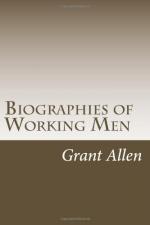As a teacher, Garfield seems to have been eminently successful. His genial character and good-natured way of explaining things made him a favourite at once with the rough western lads he had to teach, who would perhaps have thought a more formal teacher stiff and stuckup. Garfield was one of themselves; he knew their ways and their manners; he could make allowances for their awkwardness and bluntness of speech; he could adopt towards them the exact tone which put them at home at once with their easy-going instructor. Certainly, he inspired all his pupils with an immense love and devotion for him; and it is less easy to inspire those feelings in a sturdy Ohio farmer than in most other varieties of the essentially affectionate human species.
From 1857 to 1861, Garfield remained at Hiram, teaching and working very hard. His salary, though a good one for the time and place, was still humble according to our English notions; but it sufficed for his needs; and as yet it would have seemed hardly credible that in only twenty years the Ohio schoolmaster would rise to be President of the United States. Indeed, it is only in America, that country of peculiarly unencumbered political action, where every kind of talent is most rapidly recognized and utilized, that this particular form of swift promotion is really possible. But while Garfield was still at his Institute, he was taking a vigorous part in local politics, especially on the slavery question. Whenever there was a political meeting at Hiram, the young schoolmaster was always called upon to take the anti-slavery side; and he delivered himself so effectively upon this favourite topic that he began to be looked upon as a rising political character. In America, politics are less confined to any one class than in Europe; and there would be nothing unusual in the selection of a schoolmaster who could talk to a seat in the local or general legislature. The practice of paying members makes it possible for comparatively poor men to offer themselves as candidates; and politics are thus a career, in the sense of a livelihood, far more than in any other country.
In 1858, Garfield married a lady who had been a fellow-student of his in earlier days, and to whom he had been long engaged. In the succeeding year, he got an invitation which greatly pleased and flattered him. The authorities at Williams College asked him to deliver the “Master’s Oration” at their annual festival; an unusual compliment to pay to so young a man, and one who had so recently taken his degree. It was the first opportunity he had ever had for a pleasure-trip, and taking his young wife with him (proud indeed, we may be sure, at this earliest honour of his life, the precursor of so many more) he went to Massachusetts by a somewhat roundabout but very picturesque route, down the Great Lakes, through the Thousand Islands, over the St. Lawrence rapids, and on to Quebec, the only town in America which from its old-world look can lay claim to the sort of beauty which so many ancient European cities abundantly possess. He delivered his address with much applause, and returned to his Ohio home well satisfied with this pleasant outing.




